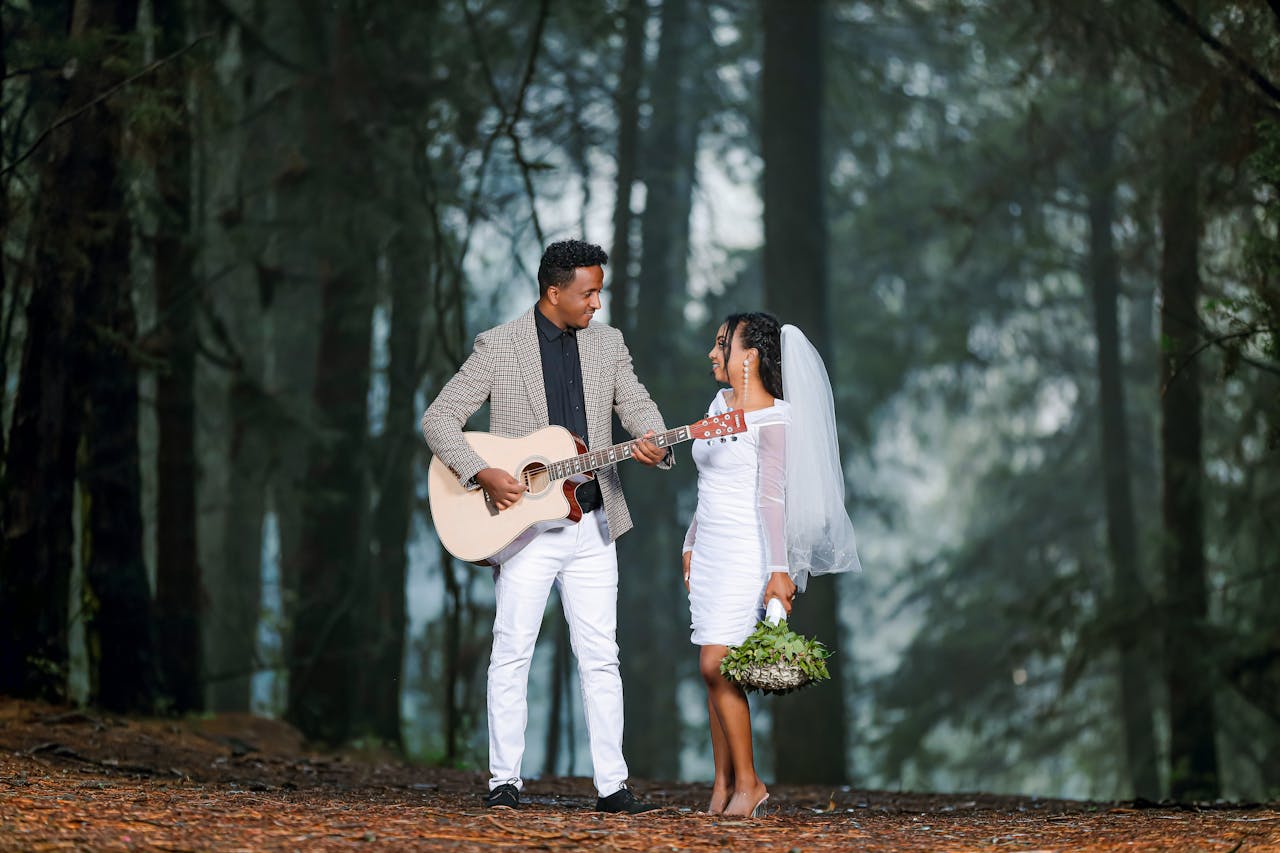The request came in unexpectedly. A friend reached out, saying they were getting married in a few months and wanted to know if I would consider writing an original song for their ceremony. At first, I hesitated. Weddings carry so much weight and emotion, and music becomes a permanent part of those memories. If I got it wrong, the song wouldn’t just be forgotten, it might leave a scar on what was supposed to be a perfect day. But after a deep breath, I agreed. That decision set me on a journey that would challenge my skills, my patience, and my ability to translate love into music.
Getting The Details Right
I started by asking them about their story. Not just when they met or how long they had been together, but the small details, the moments that mattered to them, the inside jokes no one else knew, the places they returned to again and again. I asked what they wanted people to feel when they heard the song. Did they want tears? Smiles? A sense of calm before the emotional storm of vows?
They gave me stories of first dates at a tiny café, weekend road trips with a terrible playlist, and late-night conversations on park benches. I didn’t realize it then, but those little images would become the emotional anchors for the entire song.
Finding The Tone
Writing for a wedding is not like writing for an album or even a special event. There’s no room for cynicism or ambiguity. Every lyric needs to point toward love, unity, and a sense of timelessness. Still, I didn’t want to write something generic that could fit anyone’s wedding. It needed to belong to them.
I experimented with different chord progressions, leaning toward warm, open voicings that carried a sense of hope. Major keys felt too predictable, but minor keys risked sounding somber. I ended up finding a sweet spot in a progression that started bright and shifted into something slightly bittersweet, reflecting the reality that love carries both joy and gravity.
Writing Under Pressure
The clock was ticking. I had less than eight weeks to take this from a blank page to a fully finished piece ready for performance. My usual process involves letting songs sit for days, sometimes weeks, before I decide if they work. That luxury wasn’t available here.
Some mornings I would wake up with a melody that felt perfect, only to scrap it by afternoon because it didn’t capture the right mood. Other days, I’d write a single line that was so clearly right it made the whole song fall into place. The Time I Wrote a Song for a Wedding became a lesson in trusting my instincts and not overthinking every decision.
Balancing Personal And Universal
One of the trickiest parts was balancing personal details with universal feelings. Too many inside references and guests wouldn’t connect. Too few, and the couple might feel it could be about anyone. I kept circling back to the moments they had described in our initial conversation and finding ways to weave them in without naming them outright.
For example, instead of mentioning the exact café where they met, I wrote about “a quiet corner where the noise of the world fades away.” That way, anyone could relate to the imagery, but the couple would still know the truth behind it.
Arranging The Music
Once the lyrics were mostly in place, I turned to arrangement. For a wedding, dynamics matter almost as much as melody. You need the song to feel gentle enough to suit a ceremony but strong enough to carry through a space filled with people. I kept the instrumentation simple: acoustic guitar, soft piano, and a light string arrangement for depth.
Vocally, I decided to keep my delivery intimate rather than powerful. I wanted it to feel like I was singing directly to the couple, even though I would be standing in front of a crowd.
Rehearsals And Refinements
I ran through the song at least twice a day in the weeks leading up to the wedding. Each time, I made small adjustments, pausing a beat longer before a key lyric, softening a transition, adding a subtle harmony. I even practiced playing it in front of a few trusted friends to gauge their reactions. If a line made them smile or tear up, I knew it was working.
One unexpected challenge was the length. Ceremony songs need to fit into a specific window, so I had to trim verses and tighten the bridge without losing emotional impact. That process made me appreciate the discipline of writing with constraints.
The Day Of The Wedding
When the day arrived, I was more nervous than I’d been for any concert or recording session. This wasn’t just another performance, it was part of a once-in-a-lifetime moment for two people I cared about.
I stood to the side as the ceremony began, guitar in hand. When it was my turn, I walked forward, took a breath, and started to play. The sound seemed to hang in the air longer than usual, as if the moment itself was stretching to hold every note.
I could see the couple holding hands, leaning in slightly toward each other. Guests were quiet, some smiling, some wiping their eyes. By the final chorus, my own throat tightened. Somehow, the song had become bigger than me.
After The Last Chord
When the ceremony ended, people approached me to say how much they loved the song. Some asked if I had recorded it, others said it felt like it had always belonged at that moment. The couple hugged me and whispered that it was better than they ever imagined.
In the weeks that followed, they told me they had played the recording at least a dozen times during their honeymoon. Knowing that the song continued to be part of their lives made all the hours of work worth it.
Lessons I Took Away
The Time I Wrote a Song for a Wedding taught me more than I expected. I learned that deadlines can actually sharpen creativity, that listening deeply to someone’s story is the most important part of writing for them, and that music has a unique way of holding emotions steady when everything else feels fleeting.
It also reminded me that songs don’t need to be complicated to be meaningful. The simplest melody, if it carries the right emotion, can feel monumental in the right context.
Why I Would Do It Again
Writing for a wedding isn’t easy, but it’s one of the most rewarding experiences a songwriter can have. It forces you to think beyond your own perspective and write something that will live in the hearts of others for years. It’s a responsibility, but it’s also a privilege.
If I’m ever asked again, I’ll say yes without hesitation. Not because it’s simple, but because moments like that are why I fell in love with songwriting in the first place.
Final Thoughts
Music has the power to shape memories in a way few other things can. The Time I Wrote a Song for a Wedding wasn’t just about creating a piece of music, it was about capturing the spirit of two people’s love story and giving it a melody they could carry with them forever.
That song may never appear on an album or get played on the radio, but it doesn’t need to. It found its home in a moment that mattered, and that’s more than enough.

